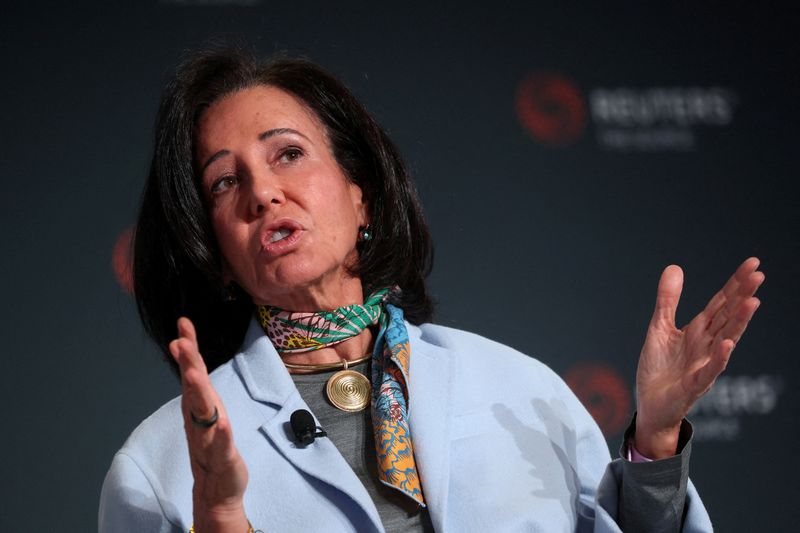Jesus Aguado, Tommy Reggioli-Wilkes, Elisa Martinuzzi
LONDON (Reuters) – Spain's Santander plans to use the United States as a base to revamp its global consumer services platform, Ana Botin, chairman of the euro zone's largest bank by market value, told Reuters.
Santander relies on 10 major markets for most of its business and wants to leverage the United States, its third-largest market by revenue, to build its own technology platform for consumer banking, including digital-only banking and consumer lending.
Santander will then roll out the platform across its retail and commercial businesses around the world, which account for nearly half of the company's total profits.
The bank is in the midst of migrating from older technology to a modern, cloud-based IT infrastructure, and the new platform is part of a wider strategy to unlock savings and increase profits through better technology and lower funding costs.
“Our goal is to use our proprietary technology to create a common platform for retail and commercial businesses, starting in the U.S. this year, but slowly but surely rolling it out across our footprint,” Botín said.
Santander did not disclose the cost of the platform migration but said it had already saved 237 million euros since 2022 thanks to the technology upgrade, including 50 million euros in the first quarter alone.
Santander's U.S. investment reflects the company's preference for the Americas, which it sees as having more growth potential than more mature European markets. So while Botin expects further consolidation in European banking after arch rival BBVA's shock hostile takeover of Spanish peer Sabadell, Santander has no plans to join it.
The bank plans to launch its digital open bank, which already serves more than two million customers across Europe, in the United States and Mexico later this year.
“In the U.S., we are starting with high-yield savings products as they allow us to grow our customer base by growing deposits outside our existing locations and replace more expensive wholesale financing for the auto business,” said Botin, who took over the bank's helm following the death of his father in 2014.
“We will then offer other products and services over time,” she added.
Santander, like other banks, is benefiting from rising interest rates, but its growth in its key Latin American markets has given it an advantage over more Europe-dependent rivals that are shrinking their presence in the Americas.
BBVA exited the U.S. market in 2020 and used the proceeds to buy back shares. HSBC and BNP Paribas also sold off their U.S. retail-focused businesses.
Santander recently overtook BNP Paribas to become the euro zone's most valuable lender after its shares rose 23 percent this year.
The bank has promised that its recent rollout of five global divisions — retail, consumer, payments, wealth and corporate and investment banking — will make the bank simpler and more efficient globally.
A successful launch of its all-digital service in the U.S. will be crucial, as Santander's U.S. business has so far delivered disappointing profits and caused some headaches.
The company's subprime auto lenders agreed in 2020 to change their underwriting practices as part of a $550 million settlement over subprime mortgages.
In the first quarter, Santander's U.S. business posted a return on tangible equity of 7.98 percent, compared with 14.9 percent for the group as a whole.
Higher employment costs and provisions caused U.S. first-quarter profits to fall 6.8% from a year earlier.
Santander is hiring about 200 people for its U.S. corporate bank, and Botin said the new hires — many of them highly paid bankers from failed Credit Suisse — are already bringing in more business.
“Our new team enables us to support our customers with our other paid services, and we're already seeing results,” Botin said, adding that the hiring was nearly complete.
Integration
BBVA's proposed takeover of Sabadell, Nationwide's takeover of Britain's Virgin Money and comments from regulators and lawmakers have rekindled hopes of further consolidation in Europe's fragmented banking industry.
Botin said he hopes to see more domestic trade instead of cross-border trading.
“I think we're going to see more M&A. It's going to happen in Germany. It's going to happen in the UK. It's going to happen in Italy,” Bottin said.
“But because the euro is effectively protected at a national level, it's much harder to justify investment and I don't think there will be as much cross-border investment,” she added.
Currently, eurozone banks cannot take deposits in one country and lend them to another.
Cross-border banking transactions in Europe are rare, with obstacles including differing regulations and labor laws, the lack of a euro zone-wide deposit insurance scheme and political resistance.
(Reporting by Jesus Aguado, Tommy Regioli-Wilkes and Elisa Martinuzzi; Editing by Tomasz Janowski)

